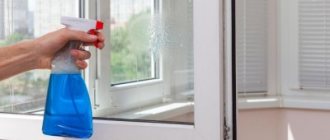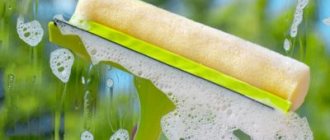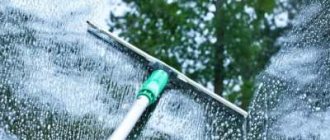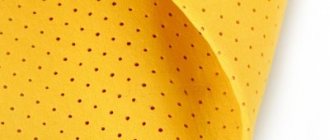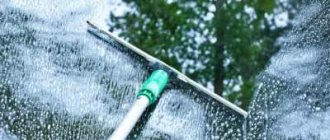Your windows will shine clean!
Preparing to wash plastic windows - what will you need?
It is necessary to prepare for such an important procedure carefully by purchasing the missing cleaning products and tools in advance at the store. In most cases, to wash plastic windows you need special products, and not universal ones for furniture or kitchens.
Useful list:
- If your windows are not heavily soiled or stained and just need to be refreshed, you can use regular washing powder or liquid detergent . You can also use a soda solution, 2 tablespoons per liter of warm water.
- Domestos gel will be needed if there are stubborn yellow stains on the frames and window sills, as well as if there are mold stains.
- Surface cleaning creams “Pemolux” or “Mr Muscle” are useful if there are visible stains on the windowsill or frames of plastic windows that are difficult to clean - for example, traces of rust, stains caused by black rubber, marks from flower pots, stains of grease or limescale.
- Surface cleaner “Mr. Proper" is the best assistant in the fight against greasy deposits on the windowsill, dark marks around the handles, dirty stains and soot stains.
- Glass cleaner - any of your choice.
We talked about the best cleaning products - but, if necessary, they can be replaced with your favorite and cheaper analogues.
Read labels carefully before use - products must be suitable for cleaning plastic!
What products are there for cleaning glass items?
When choosing cleaning products for windows or mirrors, you need to pay attention to such important factors as the chemical composition of the product and its price. Retail chains offer many different household chemical products, the main types of which are:
- Alcohol based.
In popular models of cleaning products, the main active ingredient is isopropyl alcohol. It efficiently dissolves dirt deposits and does not leave streaks on glass surfaces. The solvent properties of the alcohol base are excellent at removing light dirt and grease stains, do not require rinsing with water, and quickly evaporate from surfaces.
However, it does not always cope well with old stains. When washing heavily soiled double-glazed windows, it is better to use cleaning products with benzyl alcohol, and although it is a little more expensive, it cleans glass much more effectively.
2. Ammonia based.
Ammonia (ammonia) has long been used to remove various stains on mirror or glass surfaces. Ammonia copes well with dirt, cleans without streaks, leaving behind a characteristic glossy shine. Therefore, products made on its basis are in demand on the market.
Cleaning with substances based on ammonia is effective, but has a significant drawback - a pungent odor that is difficult to remove from the room after cleaning.
3. Based on surfactants.
The surfactant must be used in contact with oxygen. Nowadays it is actively used for cleaning; it perfectly removes all types of contaminants. However, it has disadvantages associated with high price and possible allergic reactions, so plant-based surfactants are especially in demand, which are absolutely safe, completely decompose, quickly and effectively remove stains, and do not have any odor.
The products have numerous advantages and the only drawback is the high price.
4. Based on benzyl alcohol.
A product made on its basis may additionally contain a foaming agent, which makes it easier to wash away old stains. To clean double-glazed windows, just apply the cleaner to the dirt and hold it for a minute. Then wipe with a cloth - the dirt will disappear.
Additional components
For better cleaning, additional additives are added to cleaning products, the main ones being:
- Water-repellent components. Prevents the formation of moisture on the glass, eliminates fogging of windows and the formation of dried dirt.
- Antistatic agents. Removes glass coatings from dust and small particles adhering to the glass unit.
- Silicone. Protects glass products from dust that appears immediately after cleaning.
If you need to wash a double-glazed window with existing limescale, you need to choose acid-based products that break down alkali well. Limescale and soap deposits have an alkaline base, and a universal cleaner works well with them.
When washing glass or mirror items, you need to choose the right fabric. It is advisable that she:
- absorbed water well;
- had a natural or cotton base.
When purchasing a detergent, you need to determine its purpose, which is usually indicated on the label:
- Removing plaque of intense organic pollution. We need products that clean double-glazed windows from vehicle exhaust gases, chemicals used in the fight against insects, and other contaminants that are difficult to remove. Such products are necessary for cleaning glass surfaces in the kitchen, where fatty deposits accumulate during cooking.
- Removing soap residue and limescale. Suitable for the final stage of cleaning, when laundry soap was used to wash windows. They remove stains well and are widely used for cleaning glass bags and mirrors.
- Cleaning glass surfaces with a matte finish;
- Washing glass on which a protective film is glued. Suitable for cleaning tinted car windows.
To avoid streaks on the glass, windows should not be washed in bright sun or strong wind, as alcohol quickly evaporates and water dries, leaving behind marks.
Folk remedies for washing plastic windows, namely double-glazed windows, frames and window sills
For those who like to use home remedies and recipes in cleaning, we recommend the following:
- Baking soda: Baking soda solution is suitable for both glass and plastic cleaning. If there is heavy dirt on the frames and window sill, use a paste of soda and water applied to a soft cloth.
- Vinegar: added to clean water will clean the glass well - there will be no streaks when wiping them dry. You can also use vinegar to enhance the effect of baking soda for washing plastic on windows - extinguish the slurry of 2 tablespoons of soda with a tablespoon of 6% vinegar, and wash off all existing stains with the resulting foam.
- Starch : acts as a very soft and gentle abrasive that will clean glass with shine and without streaks. A paste of starch, slightly diluted with water, will cope with stains that have become embedded in the plastic.
- Laundry soap : we do not recommend using it for glass if you do not want to spend a long time cleaning up stains afterwards. But for carefully washing plastic, soap is perfect – especially if there is a greasy coating or hand prints around the handles.
- Chalk, tooth powder : these products will help clean stubborn marks on plastic frames. But keep in mind - if the plastic is glossy, it may become abraded due to active friction!
- Eraser, alcohol, tape, vegetable oil : Any of these will help remove sticky marks from tape, tape, or labels. You can simply erase dried traces of glue with an eraser. If the marks are still sticky, or there is a lot of dust on them, treat the stains with alcohol or vegetable oil, let them dissolve for 10-15 minutes, and then wipe with a napkin and rinse with a degreaser, for example, dishwashing detergent. With tape it’s even easier: stick the tape over the old marks, wait a minute, then remove the tape with a sharp movement.
Washing tools
The market for devices and special rags for cleaning windows is impressive - it would seem that it’s high time to turn this routine work into easy fun.
But no, not all advertised “gadgets” can be useful to you - and don’t waste your money. For example, experienced housewives do not recommend buying a double-sided device that can supposedly wash glass inside and out - in most cases, it turns out to be useless, unable to cope with severe external dirt, water marks and stains. Keep in mind that the thickness of your glass units may differ from what is tested in the advertisement for this tool!
There is also absolutely no need to buy a whole arsenal of rags and sponges - for cleaning you will need much less, we assure you.
- Foam sponge - any. Shape, size and color as you like. You can take a sponge for washing your body, or for dishes - it doesn’t matter. The main thing is that it sits comfortably in your hand and matches the front of the upcoming tasks.
- A special mop for washing windows with a telescopic handle would be useful - you can use it to reach the farthest corners of the window, inside or outside, without the risk of falling out of it. As a rule, the washing surface of such mops is covered with a special fleecy cloth that cleans glass well without streaks.
- To make your work easier when collecting water on glass, purchase a special window squeegee with a silicone or rubber squeegee , which allows you to “drive” all the moisture down in one motion. After its work, all you have to do is wipe the glass until it shines.
- Cotton rags (for example, from old T-shirts, bed linen, etc.) are also useful for cleaning windows Cut them into rags of different sizes in advance.
- microfiber cloths perform well , of which it is enough to have 2-4 pieces in use. Basically, they finish the job - they rub glass and frames until they shine.
Ultra-modern assistants, what's good about them
Nowadays, people own different types of housing. These can be cottage houses, high-rise buildings, apartments with front windows. And everywhere there is a demand for effective ways to clean windows.
To do this, manufacturers make this task easier and offer convenient equipment and devices that help you quickly achieve the desired goal.
Let's look at some of them:
- Magnetic brushes can perfectly wash two surfaces at the same time, inside and outside, without the need to wash them alternately. They are 2 brushes held together by magnets.
It is also necessary to check the power of the magnets when purchasing in order to know the holding power of the brushes for double or triple glazing.
But unfortunately, magnetic brushes are not capable of cleaning corners. Therefore, the corners need to be additionally wiped separately.
- Windshield wiper from Karcher. Very functional and convenient technology. Has a handle with a container for water supply. The kit includes a special function to reach hard-to-reach places. And some models have various attachments with a rotating mechanism.
- The glass cleaning robot does an excellent job of cleaning windows. It is attached to the surface using a vacuum pump. Then he will do everything on his own. And operating such smart technology is a pleasure. Just press the desired buttons on the control panel.
Any housewife should know about the existence of various ways of how and how to properly wash plastic windows at home. Using a comparative approach and choosing the best method, you can achieve an excellent result, and sparkling glass will delight and illuminate the apartment with light.
How to remove stubborn stains and various contaminants from plastic frames and window sills, as well as glass
Tape stains
As we wrote above, products from your kitchen are well suited for this purpose - vegetable oil or vinegar, as well as tape or a school eraser.
Foam stains
These are the most problematic stains on plastic and glass on windows. We do not recommend using rough scrapers and abrasives - you will ruin the surface forever!
- If the polyurethane foam has not yet hardened, use a scraper (preferably plastic or wooden) to scrape off as much of it as possible. Then treat the foam stains with Cosmofen solvent - it will not cause damage to glass and plastic. After removing any remaining stains, wipe the surfaces well with a soft cloth, and then wash with soapy water.
- Already hardened polyurethane foam can be removed using the well-known pharmaceutical drug “Dimexide”. Apply it undiluted to the foam, wait up to 5 minutes, and then carefully remove parts of the foam using the hard side of a dish sponge. Repeat the procedure until the foam is completely removed. If the surface of the window sill is glossy, remove the last layer not with the abrasive side, but with the soft side of the sponge, so as not to leave unsightly scuffs.
Paint splashes on glass or windowsill
Do not rush to clean them with a knife, try a more gentle method - using stationery silicate glue.
Apply a drop of glue to each paint spot and let the glue dry completely. Then use a dry sponge to remove the glue bumps - the paint will come off along with them.
Stains of plaster and cement mortar
These substances are themselves abrasive. If you rub them vigorously, abrasions may remain on the plastic or glass.
Stains of building plaster, primer, putty or cement can be removed after a good soaking. Wet them with a soap solution from a spray bottle, and you can put a napkin moistened with soap and water on the windowsill. Wait a while, then use soft cloths to wash off layer by layer, rinsing the fabric all the time.
Particularly stubborn stains can be pre-soaked with 6% vinegar and then washed off with clean water.
Traces of flies
This type of stain can be easily removed with onion juice.
Cut the onion and use the cut to treat stains. Then wash the surfaces with soapy water or any detergent.
Tips for caring for plastic double-glazed windows
A few tricks for properly washing plastic profiles:
- A few drops of ordinary table vinegar or essence applied to the surface of the window will protect it from the “invasion” of flies, which is especially important in the summer.
- A small crack in glass can be permanently “neutralized” by treating it with colorless varnish.
- To give the glass a pleasant bluish tint, you can treat it with ordinary dry ultramarine. A solution of copper sulfate (1 teaspoon/1 liter of water) will give it a beautiful greenish tint.
- To prevent the glass from becoming dirty longer, after washing it must be treated with a solution of glycerin (70 g), a few drops of ammonia and water (30 g).
- A salt solution applied to the glass (2 tablespoons per 1 tablespoon of water) will protect your window from freezing.
- Do not wipe the glass dry, as it, when electrified, attracts dust well.
So, from this article you learned how to properly and efficiently care for plastic windows, when and with what to wash them, and also what to do to consolidate the result. When carrying out work on washing plastic double-glazed windows, follow safety precautions , especially if you live in a multi-story building. In this case, it is better not to take risks and call specialists from a cleaning company.
How to wash plastic windows, frames and window sills - algorithm of actions
So, we learned the theory, collected the necessary funds, and removed gross dirt and stains. Now is the time to start cleaning the windows.
- Prepare a container with warm water - first we will remove heavy dirt, dust and soot. Start from the outside of the window. Place a mop with a telescopic handle into the water, squeeze it a little, and carefully remove dust, cobwebs, and dirt from the glass and frame. If your frame is not wide, or it opens inward, great, use a soft cloth. When washing off dirt from the glass with a large amount of water (remember the neighbors below and passers-by - the water should not flow like a river!), drive it away using a glass scraper.
- We begin to wash the frames outside. Use different products to remove different types of contaminants - we described them in detail above. When finishing washing, wipe the outside of the plastic and slopes dry.
- Using the same algorithm, wash the windows inside. Pay special attention to the end surfaces of the frames and crevices - they can be easily cleaned with an old toothbrush.
- After the frames are washed, you can wash the glass. Start by cleaning the outside surface first. Apply the glass cleaner using a spray bottle, and with gentle movements - from top to bottom or vertically, but in one direction - wipe the product with napkins until the glass is dry. Don’t forget to pay attention to the corners – that’s where stains and unwashed areas sometimes remain. If the glass cleaner does not give the desired streak-free clean effect, use starch: apply it to a dry cloth and wipe the glass thoroughly. Then wipe the surface again with a microfiber cloth. In some cases, it is useful to use grandma's old method - adding shine to the glass using crumpled newspaper. But do not forget that newspaper can leave gray marks on the plastic frames! Wash the inner surface of the glass unit using the same algorithm.
- Finish washing the window by cleaning the window sill and wiping it dry.
That's it, your window is shining!
Fund rating
More than three dozen windshield wipers are mentioned in various ratings. Considering that the compilers, firstly, used different evaluation criteria, and secondly, the evaluation is subjective, the site’s editors took the 7 most frequently mentioned window cleaning products and compiled their own list of the best cleaning solutions. It included representatives of different price categories:
- “Mr. Muscle" Professional;
- "Frosch Glass Cleaner" Green Lemon;
- "Clin" Windows and Mirrors;
- "CIF"
- "Help";
- KARCHER RM 503;
- "Cinderella".
“Mr. Muscle" Professional
The windshield wiper produced in Russia is included in all ratings. In several of them it is in second place. This is the reason to put it number one on our list of the best window cleaning products.
Available in the form of liquid (500 ml bottle, considered a refill) and spray (500 ml spray bottle). The second version of the product, due to the sprayer, is about 1.5 times more expensive.
Attention: the spray bottle fits bottles with liquid. Therefore, you can buy the spray once and then purchase cheaper bottles.
Compound:
- water;
- a-surfactant < 5%;
- n-surfactant < 5%;
- organic solvent;
- sodium citrate;
- fragrance;
- ammonia;
- dyes.
You can wash glass with any type of dirt: stains, greasy and oily stains, soot, soot, insect marks, etc.
- acceptable price;
- there is no need to rinse the solution with water;
- large selection of fragrances;
- coloring to match the scent of the fragrance (lemon - yellow, apple - green, etc.);
- does not leave streaks or streaks;
- adds shine to glass;
- disinfects the surface;
- economical;
- convenient bottle shape.
- You only need to wash it with crumpled newspaper or a microfiber cloth;
- if it gets on the varnished surface of window or mirror parts, it dissolves the varnish;
- Despite the fragrance, it smells strongly of chemicals.
"Frosch Glass Cleaner"
Many housewives consider Frosch Glass Cleaner Green Lemon to be the best window cleaner. Produced in Germany in the form of a spray in 750 ml bottles.
Compound:
- water;
- AmPAV;
- fragrance (lemon);
- water-based solvents;
- cosmetic dyes.
Effectively removes all types of contaminants: stains, drips, limescale, grease, dirt not only from glass, but also from frames and window sills, especially yellowish plastic.
- affordable price (on forums they write that it is expensive, but they do not take into account the larger volume);
- Effectively cleans glass of any degree of contamination;
- is used sparingly;
- lasts a long time;
- convenient bottle shape;
- polished surfaces can be cleaned;
- minimal amount of chemicals (most surfactants are of plant origin);
- does not have a negative effect on the skin of the hands - you can work without gloves.
- pleasant smell and color (though not everyone likes it).
- not all types of contaminants are washed quickly and efficiently;
- pre-washing of the glass with clean water is required;
- when applied liberally, stains remain that take a long time to remove;
- The bottle must not be shaken - the solution foams.
Because of these disadvantages, the editors did not give the drug first place.
"Clin" Windows and Mirrors
The German company produces a line of glass cleaning products. Housewives believe that it is best to wash windows with “Clin” Windows and Mirrors. For other purposes (TV screens, computer screens, etc.) you can use “Wedge” Multigloss. The “Clin” product for Windows and Glass (manufactured in Austria) also washes the window frame and glass well, but does not add much shine or shine to the washed surface.
It comes to the market in spray bottles. For complex contamination, a mesh is installed to form foam, which makes work easier.
Compound:
- water;
- 5% A-surfactant;
- isopropyl alcohol;
- ethylene glycol monoesters;
- preservative;
- fragrance;
- dye;
- bitrex.
This composition does not require polishing the washed surface, does not leave streaks, and creates an invisible water-repellent film, which is important when cleaning glass from the outside (the glass remains clean for a long time).
- price acceptable for most Russians;
- There are always replaceable units on sale without a sprayer;
- the presence of a mesh included in the kit for foaming;
- does not leave streaks or plaque;
- you can always buy at retail outlets within walking distance;
- is used sparingly;
- convenient bottle;
- good selection of scents.
- does not remove old dirt stains well;
- it smells strong (otherwise you won’t be able to drown out the smell of chemicals);
- The aroma is not for everyone (specific).
CIF
Ultra-fast glass cleaner “Cif” is produced by Uniliver Hungary Ltd (Hungary). This is a truly fast-acting composition that dissolves all dirt in 10 seconds. All the housewife needs to do is wipe the glass with microfiber (rag, napkin). That's all. You can wash not only windows, but also mirrors, tiles, auto glass, and plastic household electrical appliances.
Produced as a spray in 500 ml bottles.
Compound:
- water;
- anionic surfactants <5%;
- fragrance;
- benzyl alcohol.
The formula of the product blocks re-contamination for a long time thanks to water-repellent components. As a result, the glass stays clean approximately 6 times longer than competitors.
- ergonomic bottle shape;
- low consumption;
- quick cleaning;
- everything shines after removing the composition from the washed surface.
- expensive;
- strong chemical smell;
- Sometimes you need to remove remaining stains.
"Help"
The product of Russian manufacturers copes well with dirt, dust, soot, grease, hand marks, stains, drips and other contaminants.
Available in 500 ml bottles with several types of fragrances, which does not affect the quality: the formula is the same. Consumers like the scents “Fresh Ozone” and “Lemon” the most.
Compound:
- water;
- Surfactants of plant origin;
- isopropyl alcohol;
- ethylene glycol;
- vinegar 9%.
- budget price;
- a universal product (it will perfectly clean a mirror, a faucet in the bathroom, or a door on the balcony);
- can be purchased at any retail outlet selling household goods;
- ergonomic bottle and spray handle;
- has an antistatic effect;
- It is used sparingly.
- when a large amount is applied to the surface to be cleaned, it begins to “soap”, leaving streaks;
- a pungent chemical odor that fragrances do not always kill;
- there is practically no difference in spray options;
- no shine effect;
- There are problems when cleaning old dirt.
KARCHER RM 503 for window cleaning
Liquid concentrate KARCHER RM 503 for window cleaning perfectly copes with the functions assigned to it:
- washing windows, mirrors - dissolves all types of dirt;
- maintenance of shower cabins;
- cleaning car glass from snow (winter) and dirt (summer).
Available in 500 ml bottles without a spray bottle. Diluted with water in a ratio of 1 to 10, in case of severe contamination, 20 ml of concentrate per 230 ml of water.
Compound:
- water;
- organic solvents - 19.9%;
- VOC (volatile organic compounds) - 19.9%;
- water repellent additives.
- high cleaning efficiency;
- dissolves any old contaminants;
- works on all smooth surfaces;
- gives the glass surface water-repellent properties;
- does not ignite spontaneously;
- leaves a shine on the glass surface.
- it is expensive, but you need to take into account that it is a concentrate;
- has an unpleasant ammonia smell.
"Cinderella"
A cheap Russian windshield wiper, despite its budget price, copes well with various dirt on the glass without leaving streaks. You can also successfully wash plastic (frame, window sill) with it.
Sold in spray bottles. Replacement units are also produced, which are almost 2 times cheaper.
Compound:
- water;
- isopropyl alcohol;
- surfactant;
- fragrance;
- dye.
The successful formula of the cleaner allows you to quickly deal with strong, old dirt, which is rarely seen with an inexpensive composition.
- budget price;
- pleasant aroma, which is surprising;
- economical consumption;
- convenient bottle shape - does not slip out of your hands;
- does not leave marks on plastic;
- there is a spray bottle.
- difficult to find on sale (not available in all regions of Russia);
- Surfactants are of synthetic origin, which requires mandatory hand protection;
- The quality of some batches of the cleaner suffers - it doesn’t clean well enough.
How to care for rubber seals and fittings on plastic windows?
Many people ignore this point, but it is very important in window care. After all, broken or poorly functioning fittings will allow dust, cold, and insects to enter your home.
- A couple of times a year - usually in spring and autumn - after general washing of the windows, you should lubricate the rubber window seals with a special silicone grease (sold in hardware stores or companies that install this type of window). If there is no lubricant, you can use glycerin. Apply the product to a soft brush or cotton swab and go over the seal.
- The metal fastenings of the frame and the handle mechanism must also be lubricated with machine oil twice a year. Apply oil with a brush or swab to the fasteners and closing mechanism. To better distribute the oil, close and open the window wide several times. At first, it is advisable to keep the windows closed to avoid dust getting into the fresh oil. After a few days, remove oil stains, if any, with a soft cloth.
By the way, it’s useful to read: 7 types of mops for washing floors - the best choice for your home

